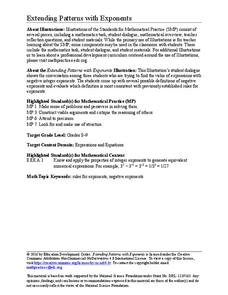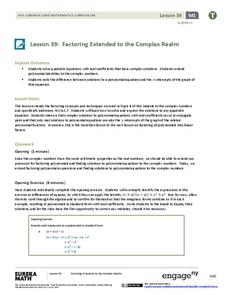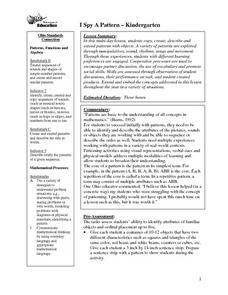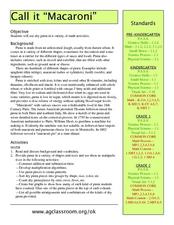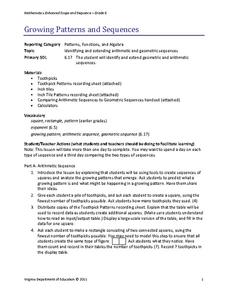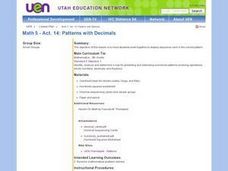National Security Agency
Growing Patterns: Practical Pattern Problems
Your learners explore growing patterns by describing, extending, creating, and evaluating practical pattern problems in this three-day collaborative unit. Beginning with concrete patterns and function tables to extend and...
PBS
Patterns to the Rescue!
Track down the Cyberchase episode that this instructional activity is associated with. Using a worksheet that is embedded in the plan, learners must find the next two numbers and shapes (a double pattern). Once these have been...
Education Development Center
Extending Patterns with Exponents
Don't think negatively about exponents. Young mathematicians dissect a fictional conversation between pupils trying to evaluate an expression with a negative exponent. This allows them to understand the meaning of negative exponents.
EngageNY
Factoring Extended to the Complex Realm
A solution will work one way or another: find solutions, or use solutions to find the function. Learners use polynomial identities to factor polynomials with complex solutions. They then use solutions and the Zero Product Property to...
Curated OER
Repeating Patterns
Students explore growth patterns by using manipulatives such as pattern blocks, investigate growth pattern of pattern, record growth in T-chart, describe how pattern is growing, and predict number of blocks needed to extend pattern.
Curated OER
I Spy a Pattern-Kindergarten
Students copy, create, describe, and extend patterns with objects. They explore a variety of patterns through the use of manipulatives, sound, rhythms, songs and movement. Cooperative processes are used to encourage partner discussion.
EngageNY
Dividing by (x – a) and (x + a)
Patterns in math emerge from seemingly random places. Learners explore the patterns for factoring the sum and differences of perfect roots. Analyzing these patterns helps young mathematicians develop the polynomial identities.
Curated OER
Call it "Macaroni"
Who knew there were so many fun educational opportunities featuring pasta? Scholars read a brief informational text about the history of pasta (note that "macaroni" is spelled two different ways, so address this if kids are reading...
NOAA
History's Thermometers
How is sea coral like a thermometer? Part three of a six-part series from NOAA describes how oceanographers can use coral growth to estimate water temperature over time. Life science pupils manipulate data to determine the age of corals...
Virginia Department of Education
Growing Patterns and Sequences
Learners explore, discover, compare, and contrast arithmetic and geometric sequences in this collaborative, hands-on activity. They build and analyze growing patterns to distinguish which kind of sequence is represented by a set of data...
Curated OER
Paper Folding to Make Cubes
Examine patterns of figures composed of six-squares and predict which of the twenty presented could be folded to make a cube. They then fold large-scale patterns of these figures to confirm their hunches.
Curated OER
Patterns
Fourth graders investigate patterns and sequences. In this patterns and sequences lesson, 4th graders use a hundreds chart to build recurring patterns. Students skip count by threes and fives on a hundreds chart by coloring...
Curated OER
VARVES: Dating Sedimentary Strata: Geology, Paleontological Patterns
Young scholars count the number of varves (annual layers of sediment) in shale billets, taken from the Green River Formation in Wyoming. The count is then extended to reflect the entire 260 meters of sediments where the billets originated.
Curated OER
Patterns
Fifth graders recognize shape and number patterns. In groups, 5th graders use strategies to find patterns. They extend the patterns and give explanations as to how they found the pattern. Students use the computer and the hundreds...
Curated OER
Patterns with Decimals
Fifth graders are given a set of manipulatives to use to develop patterns. In groups, they follow the directions to determine which blocks go with which pattern and put them into the correct sequence. To end the lesson plan, they...
Curated OER
Investigation-How Many Toothpicks?
Seventh graders use toothpicks to investigate a series of designs and identify patterns. Data is organized and analyzed using tables and graphs, and students make generalizations using algebraic expressions.
Chicago Botanic Garden
Historical Climate Cycles
What better way to make predictions about future weather and climate patterns than with actual climate data from the past? Young climatologists analyze data from 400,000 to 10,000 years ago to determine if climate has changed over...
5280 Math
Go with the Flow
Round and round they go ... where they stop, only scholars will know. By writing systems of equations, classes determine the number of cars a roundabout can handle given specific constraints. Systems use up to six variables and become...
Curated OER
Interpreting Data from Birdfeeders
What kinds of birds live in your area? Read a book about birds to your learners and explore their feeding patterns. Charts and graphs are provided in this three page packet, but consider assigning the basic questions if using with young...
02 x 02 Worksheets
Inverse Functions
Young mathematicians look for patterns in inverse functions as they relate to the original functions. The comprehensive lesson emphasizes vocabulary throughout as well as algebraic and graphical characteristics of the inverse functions.
Curated OER
I Am Golden
Middle schoolers become familiar with patterns, the Fibonacci Sequence, and the Golden Ratio. They see how many places these occur. They have practical applications for using the calculator and making charts to extend patterns.
Curated OER
Falling Into Geometry Through Paper Art
Students explore geometric shapes. In this kindergarten geometry lesson plan, students create a fall quilt consisting of three different paper geometric quilt squares that when assembled form a scarecrow, a pumpkin, and a...
Curated OER
The Reasons for the Seasons
Sixth graders conduct a controlled investigation to determine the length of the sun's shadow on a fixed object (i.e., flagpole, telephone pole, etc.) over a three-day period (one day in the fall, one in the winter, and one in the...
Curated OER
Volume and Surface Area: Which Is More?
Learners explore the volume and surface area of three dimensional figures. Through the use of video, students discover three dimensional shapes, their uses in real-life applications, and methods used to calculate their volume and surface...


